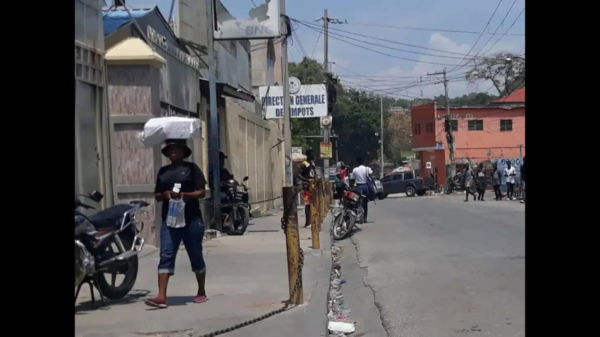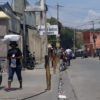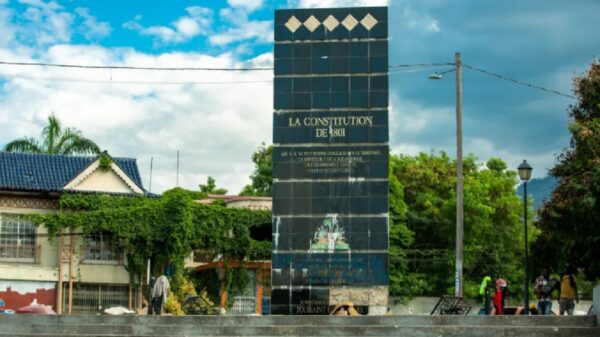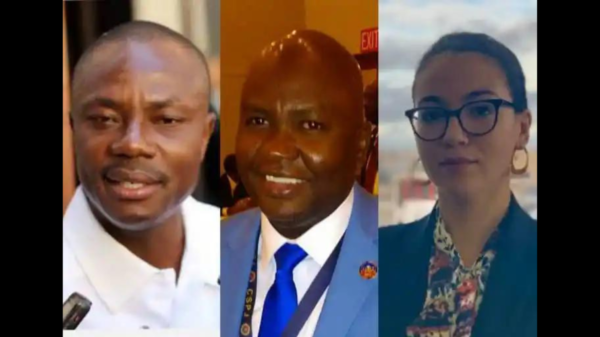By Garry Pierre-Pierre
From – https://theatlantavoice.com/
Reprinted – by Texas Metro News

(CNN) — The last few weeks have brought unthinkable upheaval in Haiti, a country that is no stranger to tragedy and suffering. The images have been graphic and disturbing: people forced from their homes by roving bands of gunmen, clutching their meager belongings and dodging bullets in the streets in a desperate attempt to find safety. Over the weekend, the US embassy, as well as the diplomatic missions of other nations and international interests, began evacuating the country.
Public order has disintegrated and there is little to no police protection. The army is outnumbered and outgunned and there is effectively no government: Haitian Prime Minister Ariel Henry, the country’s leader who has been stranded for days in Puerto Rico, said this week that he would give up his post. Announcing he would leave office after the establishment of a transitional council, Henry said, “Haiti needs peace. Haiti needs stability.”
Truer words were never spoken. And yet there is no indication that peace and stability are on the horizon for this embattled Caribbean country, where I was born and spent the first decade of my life before emigrating to the US. My family is part of the 1.2 million-member Haitian diaspora that settled in the US. Many thousands of other Haitians over the decades have settled in France, Canada and elsewhere in search of greater economic opportunity, but also to escape brutality and periodic spasms of unrest. Nothing can compare to the current upheaval in Haiti though, and I would expect new waves of Haitians to seek refuge on foreign shores.
Deep roots
The upheaval in Haiti has deep roots; It did not start with the latest spasm of violence at the hands of the gunmen overrunning the country. It dates back decades, to the rampant corruption of generations of politicians and oligarchs who continue to view the country as their personal fiefdoms.
Just half a dozen or so wealthy families control most major industries in Haiti, primarily through corrupt monopolies, which are a big part of what ails the country. The elites control virtually every aspect of Haiti’s economy. They essentially pay no taxes. Much of the aid that has poured into Haiti over the years, including for reconstruction after the devastating 2010 earthquake, benefited the upper class while much of the rest of the divided island has continued to subsist in grinding poverty. Meanwhile, Haiti’s political and business elite has had a hand in much of the drug trafficking occurring in the country, long a key source of their income. In fact, experts have said that Haiti may be linked to the trail of most of the drugs entering the US.
Elites are also linked to the very gangs that are currently being blamed for the instability that has brought the country to the brink. In 2022, the UN, US and Canada slapped sanctions on a group of Haiti’s gang leaders, politicians and business elite for their alleged roles in drug trafficking, money laundering and financing criminal activity.
Haiti’s suffering dates back even further to the brutal and extractive history of slavery and colonialism when it was controlled by France, compounded over generations by the injustice of having to repay the French for its human “property” and other assets forfeited after Haiti fought for and won its freedom from slavery — the only successful slave revolt in the world.
After securing its independence, Haiti was subjected to neocolonialism and neglect by the global superpower on its doorstep, the US. Americans may not recall that US troops occupied the country for two decades early in the 20th century and has played an outsize role in its politics and economic development — or lack thereof — ever since.
It’s lamentable that, in large part because of its tragic and tumultuous history, Haiti — a country blessed with natural beauty, abundant resources and a population that is industrious and resourceful — has never enjoyed an era of peace and prosperity.
And while the current calamity continues to unfold in Haiti, the international community — including the US — has watched the mayhem unfold mostly impassively, or perhaps even worse, with indifference. As recently as the fall of 2022, Henry’s plea for military assistance in dealing with gang violence was turned down by Washington, although the US has offered money and logistical support, and has called for the acceleration of a force to help stabilize the volatile situation on the ground. The UN was organizing an effort to get troops from several countries, chief among them Kenya, but Nairobi said this week that it would put its plan to send forces to Haiti on hold until the new government is in place.
A moment of hope
There was one relatively brief moment of hope — a shining opportunity that was ultimately squandered — when a better future might have been forged for my troubled homeland. The devastating 2010 earthquake that leveled huge swaths of the country, including the capital city, Port-au-Prince, was an unqualified disaster, killing hundreds of thousands of people.
But there was what seemed at the time like a silver lining to the disaster: Suddenly the world seemed to care about what happened in Haiti.
It is ironic that arguably one of the lowest moments in the nation’s history was also a time of great promise and possibility. Promises of billions of dollars in redevelopment assistance came from foreign governments and from international organizations. Haiti, for the first time, was going to receive the kind of top-to-bottom international focus on economic development that it had never benefited from in its entire history.
Those hopes were dashed in short order. Much of the promised aid, including some pledged support promised by the US, never arrived. Some of the aid, as was the case with a much ballyhooed Red Cross development project, appears to have been diverted from their intended beneficiaries. Much of the aid that did actually reach Haiti went where funds arriving from overseas always end up: into the pockets of the same elites who run the country and have been robbing it blind for years.
‘Papa Doc’
Starting in the late 1950s, much of the foreign aid Haiti received ended up in the coffers of its notorious leader François “Papa Doc” Duvalier. His larcenous ways were matched by his son, Jean-Claude “Baby Doc” Duvalier, who succeeded him upon his death in 1971. Jean-Claude Duvalier sent a large portion of Haiti’s financial reserves to his private foreign bank accounts and luxury real estate investments. Both father and son also spent some of the funds from Haiti’s treasury on their notorious personal security force — the dreaded Tonton Macoute — that terrorized Haiti’s citizenry. The brutality in the streets of Haiti’s capital today has echoes of this paramilitary force.
But some link today’s gang activity to a more recent chapter from Haiti’s past. They argue that the rise of the lawless gangs and Haiti’s descent into chaos date back to 1995, when Haiti’s former President Jean-Bertrand Aristide, was restored to power with the help of US troops after having been run out of the country.
Upon his return to Haiti — taking a page from the Duvalier book — Aristide dissolved the army and formed a “civilian police force” in its place, drawing from the tough streets of Port-au-Prince. He eventually would run afoul of Haiti’s oligarchs and was run out of the country once again, ending up in exile in Africa for years to follow. After his ouster, emboldened gangs evolved into criminal syndicates, trading in drugs and arms, and robbing and exploiting Haiti’s most vulnerable communities amid recurring food scarcity.
This is the tragic backdrop to the present crisis. Over the years, Haitian presidents, prime ministers and parliamentarians have engaged in a dangerous dance with the country’s gangs, often using them as their personal enforcers. These are not the street gangs familiar to some in US cities. Rather, they are loosely organized and ultimately lawless villains who delight in terrorizing the citizenry.
The leaders of the unrest today include Jimmy Cherizier — the colorfully nicknamed “Barbecue” — but there are others who are arguably just as influential and equally ruthless. Another shady character in the mix is Guy Philippe, a former soldier who led the coup that ousted Aristide from power in 2004. Philippe, now positioning himself as a presidential candidate, returned to Haiti recently after serving six years in a US prison for money laundering and other illicit activities.
But the outlaws that have overrun Haiti’s capital and mounted highly coordinated attacks on law enforcement and state institutions cannot lead Haiti into a more stable and prosperous future. Cherizier has said his goal was to overthrow Henry’s government. He and other gang leaders appear to have succeeded. What now?
Henry says he will formally step down once a new prime minister and cabinet are in place. At a meeting in Jamaica this week, the Caribbean Community and Common Market (CARICOM) said it had agreed to set up a transitional council to lay the foundations for elections in Haiti. But as commendable as the goal of the democratic franchise is, does anyone think that elections will fix what’s broken in Haiti? Will they end the grinding poverty there? Restore the dilapidated infrastructure? Will balloting prevent the resurgence of the next group of thugs that decides to take control of the country at gunpoint?
The US role
Many Haitians who would like to see their country back on its feet recognize that any solution will require sustained and deliberate involvement by the US and the broader international community. Yes, Haitians are haunted by the history of past military incursions by Uncle Sam, and ruefully recall the last failed UN mission which led to the spread of disease that caused thousands of deaths and saw acts of criminality by the same Blue Helmets sent to provide order. But sadly, Haiti is a country that has little to no other viable options.
It hurts to say it, but Haiti is a broken state. The kind of order and the investment of resources necessary to fix it simply are not achievable by the current government — or any future one, under the current conditions. Quelling the violence and reinstating order demands a holistic approach outside of the capacity of the Haitian government. Ending the chaos will only be possible with US diplomacy, influence and know-how.
Any future steps must prioritize the safety and security of the Haitian people by shoring up law enforcement, fortifying judicial institutions and addressing the root causes of gang recruitment. The government is unable to do any of that and appears unlikely to be able to in the near future either.
Haiti needs help combating corruption and loosening the stranglehold that the country’s oligarchic masters have on its economy. Efforts must be made to enhance governance and to nurture and train potential leaders from the bottom up, as a way to forge ties between the government and the people they govern. It’s the best way to ensure that Haiti is never again ruled by strongmen and kleptocrats.
Only the US and international community can divert the flow of guns and ammunition from the hands of criminal gangs. The US has shown with the results obtained by agencies like the Bureau of Alcohol, Tobacco and Firearms and the Drug Enforcement Agency in other violence- and corruption-plagued parts of Latin America and the Caribbean, that it is uniquely qualified to take on this challenge. Only with the help of Washington — the kind of assistance Henry requested a year-and-a-half ago — can the situation in Haiti be stabilized, paving a path toward or sustainable progress and development.
At some point, of course, it will be necessary to address the socioeconomic roots of gang affiliation. Access to education, vocational training and economic opportunities offering viable alternatives to a life of crime via community-based initiatives will be essential. But none of that can commence in earnest until the violence is quelled. Once it is, that restoration of peace, and additional assistance from US development agencies and international nonprofits can help lay the foundation for a Haitian government with a genuine commitment to reform and reconciliation, working hand in hand with civil society and the global community.
After decades of watchful waiting, so many Haitians are desperate to see their country advance. An acquaintance of mine there recently confided to me that because of the current upheaval he has only a two-week reserve of petrol to sustain his business; the unrest has made it impossible to obtain more. He remains sequestered in Haiti however, because he knows that leaving would mean his business would be looted and pillaged.
It used to be said that when America sneezes, the rest of the world catches a cold — so great is its might and influence. What if some of that vast power were deployed in a systematic and sustained way to help a country roughly the size of Maryland and less than two hours off its shores?
What if one of the wealthiest nations in the world turned its attention to finally ending, once and for all, the misery and desolation of the poorest nation in the Western hemisphere? Although formidable challenges lie ahead, the path to peace and stability in Haiti is possible with the right kind of help from Washington.
By addressing the underlying causes of violence, Haiti can emerge from this current upheaval to become at long last the peaceful, competently governed republic its citizens deserve and fervently believe it can be.
Garry Pierre-Pierre is the founder and publisher of the Haitian Times, a New York-based English language publication serving the Haitian diaspora. He was part of the New York Times reporting team that won the Pulitzer Prize in 1993 for reporting on the first World Trade Center bombing. He is also the co-founder of the City University Graduate School of Journalism‘s Center for Community and Ethnic Media. The views expressed in this commentary are his own









You must be logged in to post a comment Login